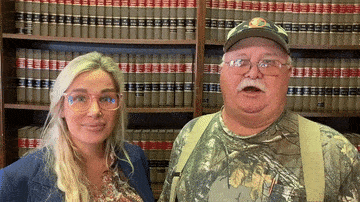“Texas Tough” McKay Law
Texas Wrongful Death Lawyer
When you lose a family member because of someone else’s negligence, the grief can be overwhelming. During such a devastating time, the thought of navigating the legal system can seem impossible. At McKay Law, we understand the profound pain you are experiencing. Our dedicated team of Texas wrongful death lawyers is committed to providing compassionate and steadfast support to families like yours. We believe in holding negligent parties accountable and are relentless in our pursuit of justice. Let us handle the legal complexities, allowing you to focus on healing, while we fight to secure the full compensation your family deserves.
NO FEES UNLESS WE WIN!
We only get paid when you get paid.
Receive Immediate Medical Care
Get the medical attention you need with no out-of-pocket cost in most cases.
24/7 Access To Us
We are here for you 24/7 so you can focus on healing.
Client Satisfaction
McKay Law has a reputation to be proud of with 300+ 5 star Google Reviews.
Texas Wrongful Death Attorney | McKay Law
When a family loses a loved one due to someone else’s negligence or wrongful act, the path forward can seem impossible. McKay Law stands as a pillar of support for families navigating these tragic circumstances across Texas. With a deep and focused understanding of the state’s intricate wrongful death statutes, the firm offers expert legal guidance tailored to each unique case. Their attorneys possess a comprehensive knowledge of the Texas Civil Practice and Remedies Code, ensuring that every legal avenue is explored. This specialized expertise is critical for building a strong case, from proving liability to accurately calculating the full extent of damages owed to the surviving family members.
McKay Law’s commitment to its clients extends far beyond the courtroom. The team operates with a compassionate approach, recognizing that they are representing people during the most difficult time of their lives. They prioritize clear and consistent communication, ensuring families are informed and involved at every stage of the legal process. This client-centered philosophy means that phone calls are returned promptly, questions are answered with patience and clarity, and the emotional toll on the family is always considered. By shouldering the legal burden, McKay Law allows grieving families the space they need to heal while remaining confident that their case is in capable and caring hands.
Ultimately, the core mission at McKay Law is to secure justice and fair compensation for those left behind. The firm is dedicated to holding negligent parties accountable for their actions and fighting for the financial stability of the families they represent. This includes pursuing compensation for lost income, loss of companionship, mental anguish, and medical and funeral expenses. By combining aggressive legal representation with a genuinely compassionate mindset, McKay Law provides the comprehensive support families need to face the future with a sense of security and closure. They are not just attorneys; they are advocates for families who have lost everything.
Understanding Wrongful Death Claims in Texas
What is a Wrongful Death Claim?
A wrongful death claim arises when someone dies due to the negligence, recklessness, or intentional actions of another party. In Texas, these claims are governed by the Texas Wrongful Death Act, which allows certain family members to seek compensation for their loss.
Who Can File a Wrongful Death Claim in Texas?
Under Texas law, the following individuals are eligible to file a wrongful death claim:
- Spouse of the deceased
- Children (biological or adopted)
- Parents of the deceased
If none of these parties file a claim within three months of the death, the executor or personal representative of the deceased’s estate may file, unless the family specifically requests otherwise.
Common Causes of Wrongful Death
Wrongful death claims can arise from various situations, including:
- Motor Vehicle Accidents: According to the Texas Department of Transportation, there were over 4,400 fatalities on Texas roads in 2022, many caused by drunk driving, distracted driving, or speeding.
- Workplace Accidents: Texas leads the nation in workplace fatalities, with industries like construction, oil, and gas being particularly hazardous.
- Medical Malpractice: Errors in diagnosis, treatment, or surgical procedures can lead to preventable deaths.
- Defective Products: Faulty machinery, unsafe consumer products, or defective vehicle parts can result in fatal injuries.
- Criminal Acts: Homicides or assaults that result in death may also lead to wrongful death claims.
- Premises Liability: Fatal accidents caused by unsafe property conditions, such as slip-and-fall incidents or building code violations.
Damages Recoverable in a Wrongful Death Claim
In Texas, damages aim to compensate the family for both economic and non-economic losses, such as:
- Economic damages: Funeral and burial expenses, loss of financial support, and medical bills related to the deceased’s final injury or illness.
- Non-economic damages: Loss of companionship, emotional pain, and suffering.
- Punitive damages: In cases of gross negligence or intentional harm, punitive damages may be awarded to punish the wrongdoer.
Statute of Limitations
In Texas, the statute of limitations for filing a wrongful death claim is two years from the date of the deceased’s death. However, there are exceptions in certain cases, such as fraud or if the claimant is a minor.
Proving a Wrongful Death Claim
To succeed in a wrongful death claim, the plaintiff must prove:
- The defendant owed a duty of care to the deceased.
- The defendant breached that duty through negligence or intentional actions.
- The breach directly caused the death.
- The family suffered damages as a result.
Statistics on Wrongful Death in Texas
- Traffic Fatalities: In 2022, Texas accounted for 14% of all U.S. traffic deaths, with 25% involving alcohol-impaired drivers.
- Workplace Fatalities: The Bureau of Labor Statistics reported 533 workplace deaths in Texas in 2021, the highest of any state.
- Medical Errors: A study by Johns Hopkins suggests that medical errors are the third leading cause of death in the U.S., with thousands of cases occurring in Texas annually.
Lindsey McKay Takes Texas Wrongful Death Cases Seriously
Losing a loved one is a devastating experience. When that loss is caused by the negligence or misconduct of another, the grief is often compounded by anger and a sense of injustice. During such a difficult time, navigating the complexities of the legal system is the last thing a family should have to worry about. This is where a dedicated and compassionate attorney can make all the difference. Lindsey McKay understands the profound impact of these losses and approaches every Texas wrongful death case with the seriousness and sensitivity it deserves.
For families in Texas, finding a legal advocate who is not only skilled but also genuinely cares is crucial. Lindsey McKay has built her practice on a foundation of empathy, a deep understanding of Texas law, and an unwavering commitment to securing justice for those left behind. She recognizes that a wrongful death claim is about more than financial compensation; it’s about holding responsible parties accountable and providing a measure of closure for grieving families.
Understanding Wrongful Death Claims in Texas
A wrongful death lawsuit arises when a person’s death is the direct result of another party’s wrongful act, neglect, carelessness, or default. Texas law allows certain surviving family members, such as a spouse, children, or parents, to file a claim seeking damages. These cases are incredibly complex, requiring a thorough investigation and a clear understanding of the state’s statutes.
Lindsey McKay has extensive experience navigating the legal landscape of wrongful death claims. She helps families understand their rights and guides them through each step of the process. This includes gathering evidence, identifying liable parties, and building a compelling case to prove fault. Her meticulous approach ensures that no detail is overlooked in the pursuit of justice.
A Compassionate Approach for Grieving Families
One of the most significant challenges for families is the emotional toll of a legal battle while they are still mourning. Lindsey McKay prioritizes a compassionate, client-centered approach. She takes the time to listen to her clients’ stories, understand their pain, and provide the supportive counsel they need.
This empathetic approach means she handles the legal burdens so the family can focus on healing. Regular, clear communication is a cornerstone of her practice. Clients are kept informed about the progress of their case without being overwhelmed by legal jargon. This partnership ensures families feel heard, respected, and confident that their best interests are being fiercely protected.
Expertise Across Various Wrongful Death Cases
Wrongful death can occur in many different circumstances. Lindsey McKay has the experience and legal knowledge to handle a wide range of cases, each with its unique challenges and complexities.
Car and Truck Accidents
Collisions involving cars, motorcycles, and commercial trucks are a leading cause of wrongful death. Proving negligence in these cases often involves accident reconstruction, witness testimony, and analysis of driving records. Lindsey McKay works diligently to demonstrate how another driver’s recklessness—whether due to drunk driving, distracted driving, or violating traffic laws—led to the tragic loss of life.
Workplace Accidents
When an employer fails to provide a safe working environment, the consequences can be fatal. Workplace accidents, particularly in industries like construction and oil and gas, can lead to wrongful death claims. These cases may involve violations of safety regulations, defective equipment, or insufficient training. Lindsey McKay fights to hold negligent employers accountable and secure compensation for the victim’s family.
Medical Malpractice
Losing a loved one due to a preventable medical error is a particularly painful experience. Cases of medical malpractice can involve surgical errors, misdiagnosis, or prescription mistakes. These claims require a deep understanding of both legal and medical standards of care. Lindsey McKay collaborates with medical experts to build a strong case proving that a healthcare provider’s negligence caused the patient’s death.
Seeking Justice and Fair Compensation
While no amount of money can replace a loved one, a successful wrongful death claim can provide financial stability for a family facing an uncertain future. Lindsey McKay is committed to securing the maximum compensation possible for her clients. This can include damages for:
- Lost earning capacity and future income
- Loss of companionship, support, and guidance
- Mental and emotional anguish suffered by the family
- Medical expenses incurred before the death
- Funeral and burial costs
Her dedication is not just about the final settlement; it’s about ensuring the family receives the resources needed to move forward.
Take the First Step Toward Justice
If your family has suffered the loss of a loved one due to someone else’s negligence, you do not have to face this journey alone. Lindsey McKay is prepared to stand by your side, offering the skilled legal representation and compassionate support you need. She takes Texas wrongful death cases seriously because she knows what is at stake for your family.
Contact the Law Office of Lindsey McKay today to schedule a confidential consultation. Let her help you understand your legal options and fight for the justice your loved one deserves.
What Are The Most Common Causes For Wrongful Deaths In Texas?
The most common causes of wrongful deaths in Texas include:
- Motor Vehicle Accidents: This includes car, truck, motorcycle, and pedestrian accidents, often caused by negligence such as distracted driving or impaired driving.
- Medical Malpractice: Errors in medical treatment, misdiagnoses, or negligence by healthcare professionals.
- Defective Products: Faulty machinery or products that lead to fatal injuries.
- Premises Liability Incidents: Accidents occurring due to unsafe conditions on someone else’s property, such as falls.
- Workplace Accidents: Particularly in industries like construction, where faulty equipment or unsafe practices can lead to fatalities.
- Abuse or Neglect: Cases involving elder abuse, neglect, or other forms of mistreatment.
What Damages Can I Receive from a Texas Wrongful Death Claim?
Losing a family member is an incredibly painful and life-altering experience. When that loss occurs because of someone else’s negligence or wrongful actions, the grief is often intensified by a mix of anger, financial stress, and the need for justice. During such a difficult time, understanding your legal rights and options is crucial to ensure your family receives the support it needs to move forward.
In Texas, the law allows specific family members—such as spouses, children, and parents—to file a wrongful death claim against the party responsible for the loss. This legal action seeks to provide compensation, known as damages, to help ease the financial burden caused by the tragedy and to hold the negligent party accountable.
Damages in a Texas wrongful death claim can include financial compensation for medical expenses, funeral costs, lost income, and benefits the deceased would have provided to their family. Additionally, non-economic damages, such as pain and suffering, loss of companionship, and emotional distress, may also be awarded. In some cases, punitive damages may be pursued to punish the responsible party for their actions and deter similar behavior in the future.
Economic Damages: The Financial Losses
Economic damages are the most straightforward type of compensation. They are designed to cover the tangible, calculable financial losses that result from your loved one’s death. These damages are meant to restore the financial stability that was lost.
Lost Earning Capacity
One of the most significant financial impacts of a wrongful death is the loss of the deceased’s income. You can claim damages for the wages, salary, and other benefits your loved one would have earned and contributed to the family throughout their expected working life. This calculation often involves experts who project future earnings based on the deceased’s age, health, profession, and earning history.
Loss of Inheritance
This category covers the net assets the deceased would have likely accumulated and left to their heirs had they lived a full life. This is a complex calculation that considers potential savings, investments, and property accumulation over time.
Loss of Services
Your loved one may have provided essential services to the household, such as childcare, home maintenance, financial management, or cooking. Economic damages can compensate for the monetary value of these lost services. You may now have to pay for services that your family member once provided for free.
Medical and Funeral Expenses
If the deceased incurred medical bills for their final injury or illness before passing away, these costs can be recovered. Additionally, reasonable funeral and burial expenses are also considered economic damages that the family can claim.
Non-Economic Damages: The Intangible Losses
While financial losses are significant, the emotional and personal impact of losing a family member is immeasurable. Non-economic damages attempt to provide compensation for these profound, intangible losses. While no amount of money can replace your loved one, these damages acknowledge the immense personal suffering involved.
Mental Anguish and Emotional Pain
This is compensation for the grief, sorrow, and emotional distress suffered by the surviving family members. The court considers the emotional toll that the death has taken on the spouse, children, and parents.
Loss of Companionship and Society
This refers to the loss of the positive benefits of a family relationship. For a spouse, it can mean the loss of love, affection, and partnership. For a child, it means the loss of parental guidance, care, and nurturing. For a parent, it is the loss of the unique bond with their child.
Loss of Consortium
Specifically for a surviving spouse, loss of consortium compensates for the loss of intimacy, affection, and emotional support that was part of the marital relationship.
Punitive Damages (Exemplary Damages)
Punitive damages, known as “exemplary damages” in Texas, are different from the other two categories. They are not intended to compensate the family for their losses. Instead, their purpose is to punish the defendant for extremely reckless or malicious behavior and to deter similar conduct in the future.
These damages are only awarded in cases where the defendant’s actions were found to be grossly negligent or intentional. For example, if a death was caused by a drunk driver with a history of DUIs, a court might award punitive damages to send a strong message that such behavior is unacceptable. There are specific legal standards that must be met to receive these damages, and they are not awarded in every case.
What is a Survival Action?
It is also important to know about a related but separate claim called a “survival action.” While a wrongful death claim compensates the family members for their own losses, a survival action is filed on behalf of the deceased’s estate.
This claim seeks damages for the suffering the deceased person endured before they died. This can include:
- Conscious pain and suffering
- Medical expenses incurred before death
- Lost wages from the time of injury until death
- Funeral expenses
Often, a survival action and a wrongful death claim are brought together in the same lawsuit.
Seeking the Legal Guidance You Deserve
Navigating the complexities of a wrongful death claim while grieving is an overwhelming challenge. The legal system has specific rules, deadlines, and requirements for proving damages. Calculating the full extent of your family’s losses requires careful analysis and often the help of financial and economic experts.
If you have lost a loved one due to someone else’s negligence, you do not have to face this journey alone. Consulting with a qualified wrongful death attorney in Texas can provide the support and guidance you need. An experienced lawyer can help you understand your rights, build a strong case, and fight for the full compensation your family deserves. Taking this step can help secure your financial stability and allow you to focus on healing.
The Texas Tough Difference
See why so many others choose McKay Law, PLLC
With over 300 five-star reviews, McKay Law, your local Personal Injury Law Firm has earned the trust and gratitude of our clients. Every case we handle is unique, and every client’s story matters. Don’t just take our word for it—hear directly from our clients about their experiences and why they confidently recommend us to others.
Wrongful Death FAQs
A wrongful death claim is a type of lawsuit brought by the survivors of a person who has died as a result of another party's negligence, recklessness, or intentional act. The purpose of this civil action is to hold the responsible party accountable and seek compensation for the losses suffered by the deceased person's family or estate.
State laws specify who is eligible to file a wrongful death claim. Typically, the claim must be filed by a personal representative of the deceased person's estate. This representative acts on behalf of the surviving family members, such as a spouse, children, and sometimes parents or other dependents who have been directly affected by the death.
Damages in a wrongful death case are intended to compensate the surviving family members for their losses. These can be categorized into two types:
- Economic damages: These include the loss of financial support, loss of benefits (like retirement), loss of inheritance, and the cost of medical and funeral expenses.
- Non-economic damages: These cover intangible losses, such as sorrow, mental anguish, loss of companionship, loss of guidance, and loss of consortium (the loss of a spousal relationship).
The statute of limitations is the time limit for filing a lawsuit. For wrongful death cases, this period varies by state but is often two or three years from the date of the person's death. It is crucial to act promptly, as failing to file a claim within this window will likely result in the court dismissing the case.
To succeed in a wrongful death lawsuit, the plaintiff (the person filing the claim) must prove several key elements. These include showing that the defendant had a duty of care toward the deceased, that the defendant breached that duty through a negligent or intentional act, and that this breach was the direct cause of the person's death, leading to quantifiable damages for the survivors.
Yes. A wrongful death claim is a civil lawsuit, which is separate from any criminal charges the state may pursue. The purpose of a civil case is to secure financial compensation for the family's losses, while a criminal case aims to penalize the wrongdoer for breaking the law. The outcomes of the two cases are independent of each other.
While both are related to a death caused by another's wrongdoing, they address different losses. A wrongful death claim compensates the surviving family members for their own losses resulting from the death. A survival action, on the other hand, is brought by the estate to recover damages that the deceased person would have been entitled to claim had they survived, such as their own pain and suffering and medical bills incurred before death.
The value of a claim is calculated based on various factors, including the deceased person's age, earning capacity, health, and life expectancy. The court will also consider the financial contributions they would have made to their family, as well as the non-economic losses suffered by the survivors, such as loss of companionship and guidance.
Wrongful death can arise from many different situations where negligence or misconduct leads to a fatality. Common examples include car and truck accidents caused by reckless driving, medical malpractice, workplace accidents due to unsafe conditions, defective products, and acts of violence.
While it is not legally required, it is highly recommended to work with an experienced wrongful death attorney. These cases involve complex legal procedures, strict deadlines, and challenging negotiations with insurance companies. A lawyer can help navigate the process, build a strong case, and advocate for the full compensation your family deserves.






